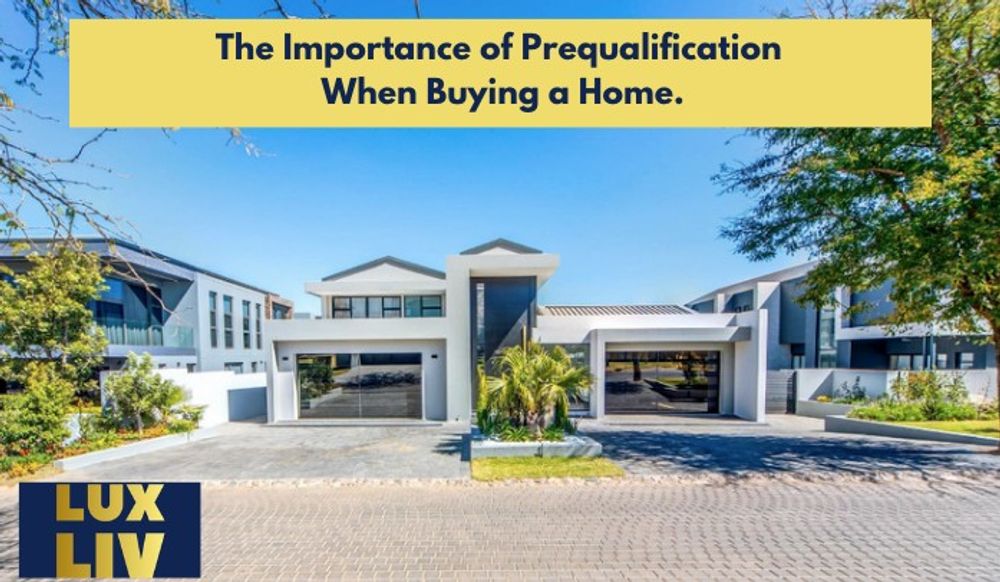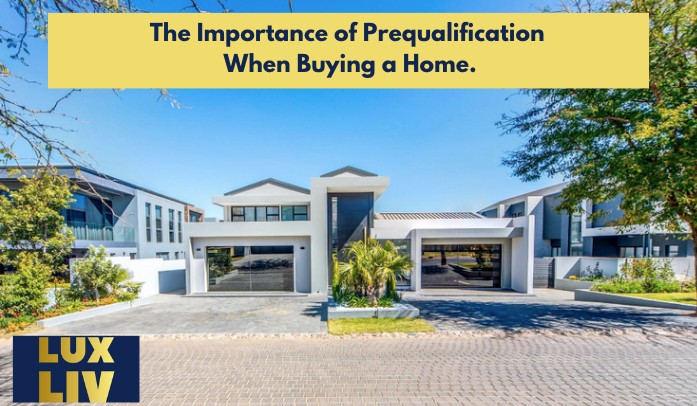Buying a home is one of the biggest financial decisions most people will ever make, and navigating the complex process can be overwhelming. One crucial step that is often overlooked or underestimated is prequalification. It’s a simple process that can set the stage for a smoother, more successful home-buying experience. Whether you're a first-time buyer or a seasoned homeowner, getting prequalified is a key move that will guide you through the financial side of purchasing a property.
Here’s why prequalification is such an essential step and what it means for buyers looking to purchase a home in South Africa.
1. Knowing What You Can Afford
The biggest advantage of prequalification is that it gives you a clear understanding of how much you can afford. When you get prequalified, a bank or financial institution assesses your financial situation, taking into account your income, debts, and expenses to estimate how much they’d be willing to lend you. This gives you a realistic budget range, helping you avoid disappointment by falling in love with homes outside of your financial reach.
For many, discovering what they can comfortably afford often shifts their perspective on what their dream home looks like. By knowing your limits upfront, you can narrow your search to homes that align with your budget, saving time and effort in the long run.
2. Strengthening Your Position with Sellers
Prequalification also strengthens your position as a buyer in the eyes of sellers. In a competitive market, sellers are more likely to take offers seriously if they come from prequalified buyers. Having a prequalification letter shows that you are financially prepared, making your offer more attractive compared to others who may not have gone through the process yet.
In South Africa’s property market, where homes can be sold quickly, being prequalified can give you an edge. Sellers may favor buyers who have already taken this step, knowing that the sale is less likely to fall through due to financing issues.
3. Faster Loan Approval Process
Another important reason to get prequalified is that it speeds up the loan approval process once you’ve found your ideal home. Prequalification is like a preliminary check — you’ve already provided your financial documents, and the bank has made an initial assessment. When you apply for a home loan after finding a property, the bank will already have most of the information they need, allowing for a quicker final approval process.
This is especially important because, once an offer to purchase has been signed, there’s a limited window to secure financing. Typically, buyers have around 14 days to obtain bond approval. Prequalification helps you avoid delays, ensuring you meet the deadlines and don’t risk losing the home.
4. Avoiding Surprises Later in the Process
Prequalification serves as a financial reality check. It’s important to know early on whether there are any issues with your credit or financial situation that could impact your ability to get a home loan. If problems arise during the prequalification process, such as insufficient income or high debt levels, you have time to address these concerns before making any offers on a home.
Without prequalification, buyers might assume they’ll easily get a loan, only to be caught off guard when the bank declines their bond application. This can be an emotional and financial setback after already investing time and money in the buying process.
5. Tailoring Your Loan Application
Banks have different criteria for home loan approvals, and the prequalification process helps you understand how much different financial institutions are willing to lend. In some cases, working with a bond originator can help you compare multiple banks to find the best deal.
For example, certain banks might offer you a better loan-to-value ratio, which determines how much of the property value they’re willing to cover. You may also find out whether you qualify for a 100% bond or if you’ll need to put down a deposit. Knowing these details upfront allows you to tailor your home search to properties that fit within your financing options.
6. Maintaining Financial Stability After Prequalification
It’s crucial to understand that prequalification is typically valid for about three months and is based on your current financial situation. However, if your financial situation changes before the bond registration is completed, your approval could be at risk. For example, taking on new debt or making significant financial commitments after being prequalified could cause the bank to reassess or even withdraw their approval.
This is why it’s essential to maintain financial stability throughout the home-buying process. Avoid opening new credit lines or making large purchases until after your home loan has been finalized and registered. Staying disciplined ensures that your prequalification holds and that you can secure your home loan without any hiccups.
Conclusion: Prequalification is the Key to a Smoother Home-Buying Process
In South Africa’s dynamic property market, prequalification is more than just a formality — it’s a smart financial tool that can make your home-buying journey smoother and more successful. It gives you clarity on what you can afford, strengthens your negotiating power with sellers, speeds up the loan approval process, and helps you avoid any unpleasant surprises later on.
For serious buyers, taking this step is a no-brainer. By getting prequalified, you set yourself up for success and increase your chances of finding the right home while staying within your financial means. So before you start house hunting, get in touch with your bank or a bond originator and take the first step towards owning your dream home.


